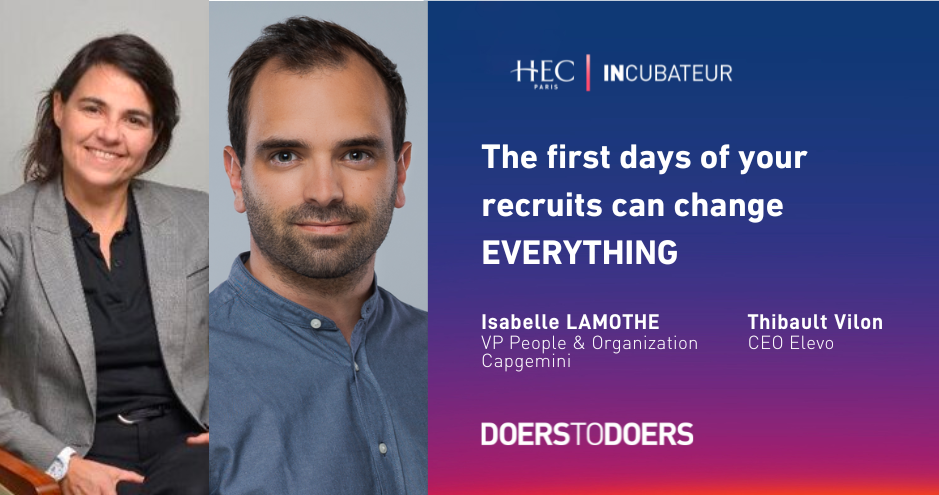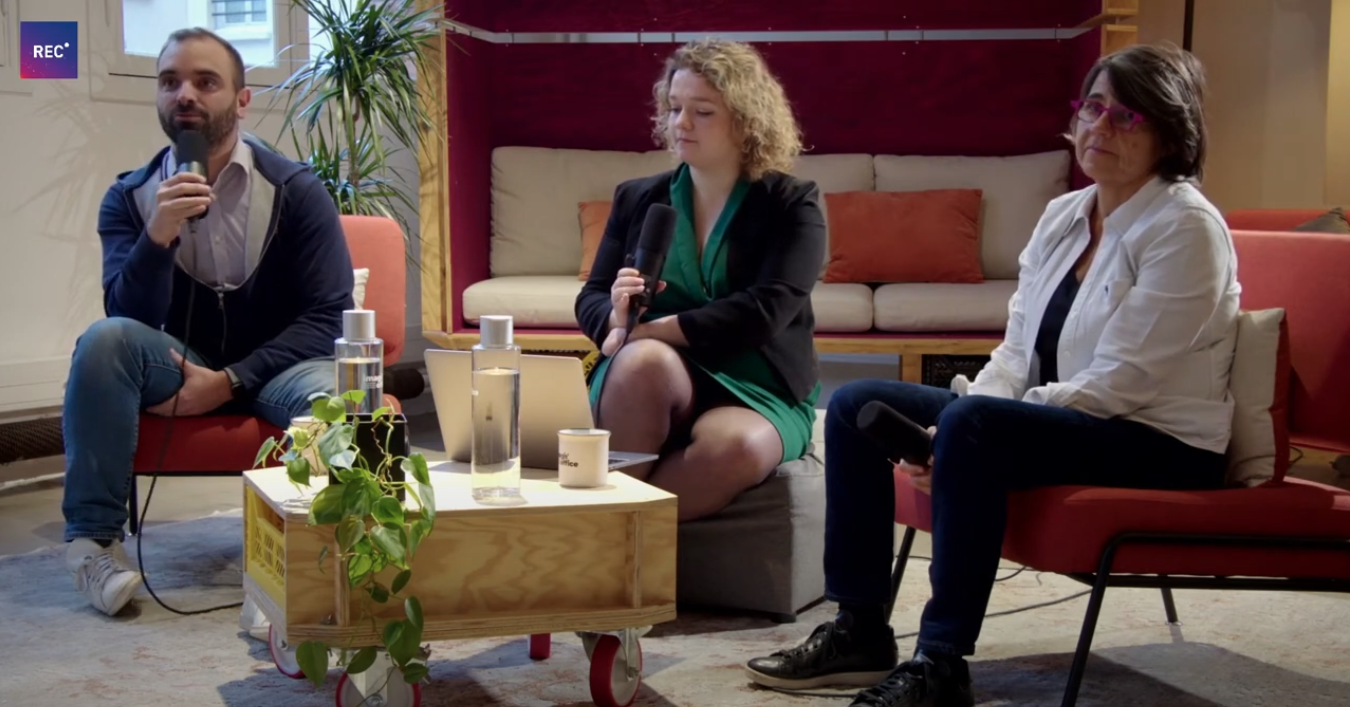The first days of your recruits can change EVERYTHING
The first days of your recruits can change EVERYTHINGLet's dive into the HR dimension with this new "Doers to Doers," a flagship event of the Incubateur HEC Paris. Doers to Doers offers pragmatic feedback and concrete advice from experts to entrepreneurs.

Today, we focus on the sensitive theme of onboarding: how to avoid mishandling the crucial first days of new hires, where everything can change. Isabelle Lamothe, VP & People Organization at Capgemini Invent, and Thibault Vilon, CEO of Elevo, a startup specializing in HR that has grown its staff from 0 to 40 over the past 6 years, have agreed to share their practical approaches to managing 'new' human resources.
The Fundamentals of Successful Onboarding
For Isabelle Lamothe, with her extensive experience as an HR Director, a well-structured onboarding process is crucial, "because it has a direct impact on the productivity and well-being of new recruits."
Far from being a mere administrative formality, it is the first impression that an employee gets of the company, and it can durably influence their engagement and loyalty.
For Thibault Vilon, structuring the onboarding process does not mean overwhelming new hires with information on their first day. It’s all about an iterative approach where information is shared in a controlled and phased manner over time.
Our two experts break down this time frame into three stages: pre-boarding, onboarding, and offboarding.
Pre-boarding: An Often Overlooked Phase
Let's not forget, integration starts well before the first day! Although essential, the pre-boarding phase—the period between the future employee's acceptance of the job offer and the actual start of the contract—is often neglected. When well-orchestrated, it gives new hires a positive glimpse of what their new professional life will be like. New recruits will feel connected, supported, and ready to fully immerse themselves in their role.
Nurturing this phase is therefore about solidifying that elusive "good impression," anticipating the needs of new employees, and most importantly, ensuring that new arrivals feel valued from the very first moment.
In practice, this involves strengthening the bond with the future employee through regular communications or a team lunch, making them feel expected and already part of the team. Thus, a personalized welcome email (or welcome kit) from the CEO, the HR team, or the future manager will be greatly appreciated.
"This phase is a unique opportunity to familiarize them with the company culture and prepare them for their new roles without actually making them work!" says Isabelle Lamothe.
Onboarding: Anticipate and Invest Time
The first days at a new company... A nightmare for many! Diving into the deep end can sometimes feel overwhelming: "introductions to management, teams, the premises, projects, partners, schedules, clients—the cup fills up quickly," warn the two experts. Here are some tips to ensure the success of your new hires' first days.
Internal ‘Knowledge Base’ and Flexibility
The first day of onboarding—and the days that follow—can be prepared a few days before the new employee's arrival. Thibault advises taking the time to spread out this learning process over a period of about two weeks. "Don't think that dedicating four weeks to training is enough, and then, come Monday, the person is all set!" warns Thibault.
To help plan these initial days, Thibault explains that at Elevo, "we rely on an internal knowledge base on Notion, which I believe should be treated as a valuable asset for your company." This emphasizes the importance of taking the time to build and maintain it.
Isabelle, who agrees with Thibault on this point, adds that it is crucial to pay attention to this phase because "when you hire, you invest." That's why she suggests structuring it well without only focusing on job-specific knowledge. "Explain where people have lunch, where the photocopier is, what the office hours are... These basic logistical details are an integral part of a good welcome," Isabelle adds. For informal learning, Isabelle recommends relying on a ‘buddy,’ a colleague who can answer all the unofficial questions and fill in the gaps that aren't documented.

Investing in Rigorous Planning
Creating a sense of preparation and anticipation can help reduce the stress of new hires. Informing them in advance about what their first days will look like can bring peace of mind. They should also be informed of the name and role of the person who will be their mentor/guide upon arrival.
Rigor is essential for welcoming your new hire. Thibault Vilon advises sending the employee a detailed agenda that spans several weeks to avoid overwhelming them on the first day, allowing them to better absorb and apply what they learn. Admittedly, this phase will require time investment, but remember that every hire demands commitment as well.
The schedule should include training sessions, team introductions, and dedicated time for learning internal tools and processes. Other tried and tested methods by Thibault to help understand the role, organization, and positioning are:
A half-hour or coffee with nearly every person on the team to understand each other's roles, their impact, and their perspectives on the new hire's role.
Shadowing, which involves attending a meeting or another operational activity to observe what happens. "For example, someone joining marketing will shadow a sales rep who is presenting the solution," explains Thibault.
First Steps in the Company: Company Rituals, Expression Space, and Performance
One concept not to overlook, according to Isabelle, is rituals, which are essential for successful integration. These socialization moments, such as team meetings, shared lunches, and other bonding activities, help create a sense of belonging.
By participating in these rituals, new hires feel integrated and assimilate the company culture. Isabelle Lamothe emphasizes the importance of maintaining these rituals, even remotely, to strengthen team bonds and cohesion. "Finding moments where everyone gathers, even virtually, is essential for maintaining the sense of belonging," she advises.
Thibault Vilon, on the other hand, stresses the importance of creating spaces where new employees can freely express themselves and regularly gather feedback through debrief reports or feedback sessions. Asking questions like 'Is your work aligning with what was promised?' helps integrate the new hire into their work processes. This method is effective for quickly identifying areas for improvement, benefitting from fresh perspectives on your methods, and continuously adjusting and enhancing the onboarding process.
According to Isabelle, this caring approach should also be combined with a more sensitive notion: performance. This is one of the greatest challenges of onboarding! For her, encouraging new hires to express themselves freely goes hand in hand with the necessity of providing them with the resources they need to succeed. But caring does not exclude rigor. On the contrary, it can even enhance performance by making employees feel supported.
What about offboarding?
Both of our experts agree: you need to handle the communication around an employee’s departure carefully. Often overlooked, this step can impact your brand image among your team members. “It’s not something you can sweep under the rug,” warns Isabelle. Thibault adds, “If you don’t communicate when people leave, your teams will imagine all sorts of scenarios, and these assumptions will tarnish your company.”
So, there you have it—most of what you need to know to successfully integrate your future hires! For even more advice for entrepreneurs, check out our previous article on the theme ‘Content Saved Our Startups!’ (in French).
About Doers to Doers
Unlike traditional conferences or theoretical masterclasses, Doers to Doers is characterized by direct and interactive exchanges with experts and other entrepreneurs who have already overcome similar challenges.
This peer-to-peer learning allows participants to ask specific questions and receive answers based on real-life experiences, without the usual academic or commercial filters.
About Incubateur HEC Paris
The Incubateur HEC Paris is a bespoke, customizable, and participatory startup support program. It leverages all the resources of the HEC ecosystem to assist talented entrepreneurs. Located at the heart of Station F, the largest startup campus in the world, the program aims to enable entrepreneurs to achieve in 3 months what they would typically reach on their own in 1 year.
About the HEC Paris Innovation & Entrepreneurship Institute
The institute supports entrepreneurs from all walks of life. Through our Incubation & Acceleration, Deeptech, and Social Entrepreneurship centers, we help students with innovative ideas, budding startups or unicorns on the rise, accelerating SMEs, large transforming companies, and social or environmental entrepreneurs to develop effectively and with impact. Here, the entire entrepreneurial ecosystem of HEC Paris converges to allow you to Make it Happen, Make it Big.